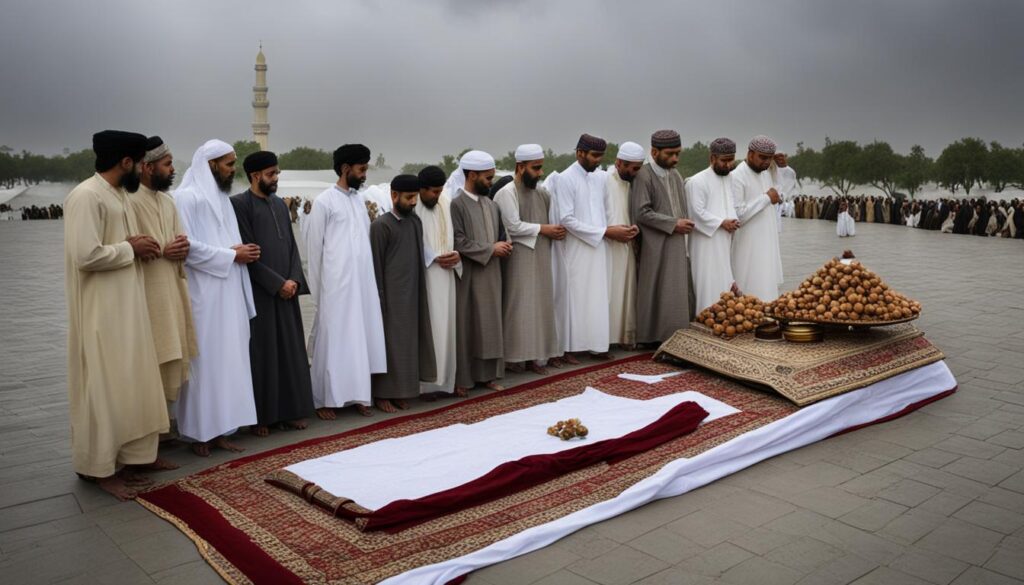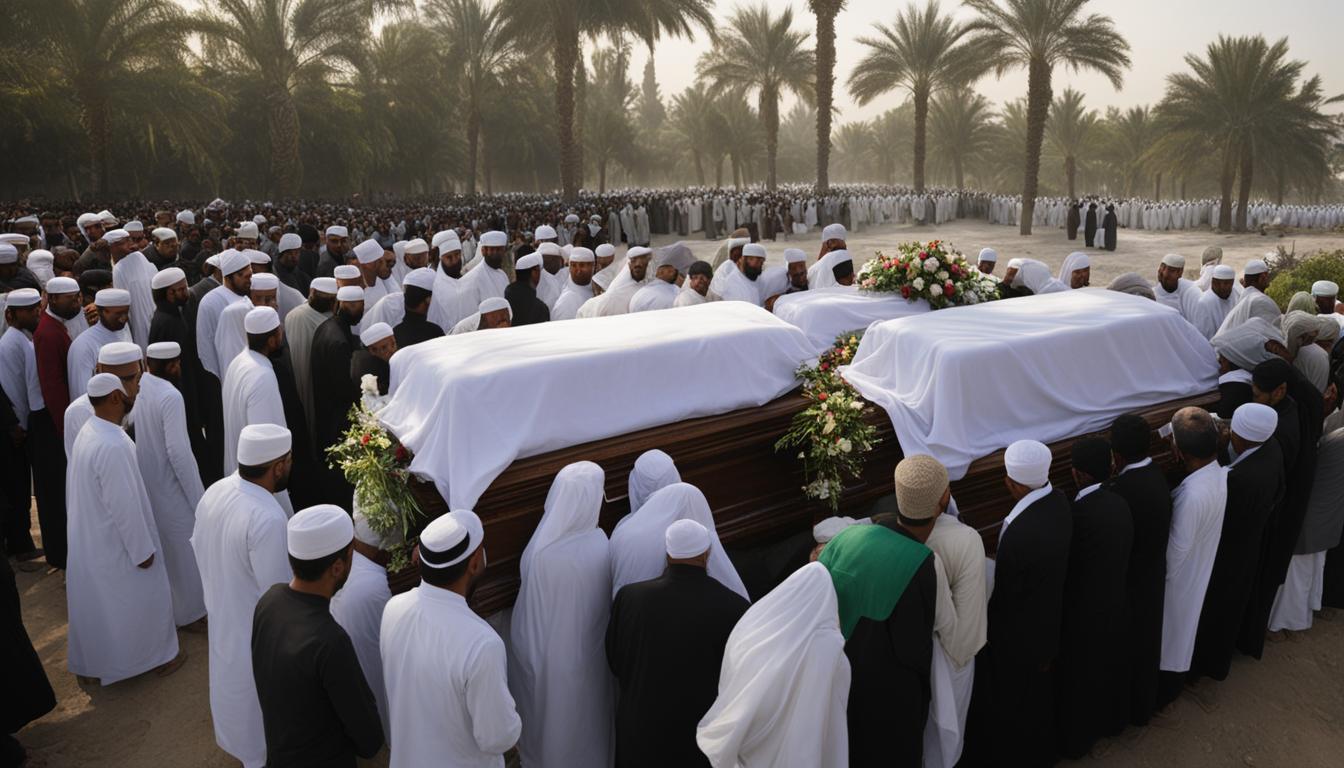A Muslim funeral, known as a “Janazah,” is a solemn and sacred ceremony that follows specific customs and traditions prescribed by Islamic religious law. It is a time for the community to come together to mourn the loss of a loved one and seek solace in Islamic teachings and practices.
Key Takeaways:
- A Muslim funeral is called a “Janazah” and is typically conducted within 24 hours of the deceased’s passing.
- Muslim funeral rituals include washing and shrouding the body, funeral prayers, and a post-funeral reception.
- The deceased is wrapped in a white sheet and laid upon three large white sheets of material before being taken to the mosque.
- Cremation is strictly forbidden in Islam, and burial takes place as soon as possible after death.
- Proper attire and respectful behavior are expected when attending a Muslim funeral.
Preparation of the Body and Funeral Prayers
Before a Muslim funeral service, the body of the deceased goes through a series of preparations. The body is washed three times, a ritual known as Ghusl, by same-sex family members or community members. This process is done to purify and cleanse the body before burial. After washing, the body is then shrouded in a white cloth, known as Kafan.
During the preparation, the deceased’s body is laid upon three white sheets and tightly wrapped with ropes. It is important to note that there is no viewing of the body before the funeral service, as it is believed to be respectful to the deceased.
Following the preparations, funeral prayers, also known as Salat al-Janazah, are performed by the family and community. These prayers are led by an Imam and include readings from the Quran. The purpose of the funeral prayers is to seek forgiveness for the deceased and to pray for their soul’s peaceful transition to the afterlife.
Overall, the preparation of the body and funeral prayers are integral parts of a Muslim funeral. They hold significant religious and cultural importance, as they symbolize the final rites and send-off for the deceased.
Burial Customs in Islam
In Islam, the burial customs hold great significance and are guided by religious traditions. The process of burial in Islam begins with the body being laid to rest as soon as possible after death. Typically, the burial takes place within 24 hours. It is considered a sacred duty to bury the deceased promptly to honor their soul and allow it to transition to the afterlife.
During the burial, the body is placed in a grave that is positioned at right angles to the direction of Mecca. The deceased is laid on their right side, facing the holy city. Unlike in many other cultures, Islamic funerals do not involve the use of coffins or burial caskets. Instead, the body is placed directly in the ground. This practice symbolizes the return of the deceased to the earth from which they were created.
Customs at the Gravesite
At the gravesite, mourners gather to bid their final farewell to the deceased. As an act of respect and remembrance, wood and stones may be placed on top of the body to prevent direct contact between the person and the soil. It is also customary for mourners to pour handfuls of earth onto the grave, symbolizing the return of the deceased to the earth.
Islamic customs discourage the use of elaborate tombstones or structures over burial sites. Instead, a small, simple marker or wreath is often used to mark the location. This simplicity reflects the belief in the equality of all individuals in death, regardless of their worldly possessions or status.

Conclusion
Muslim funerals, known as Janazah, encompass a range of customs and traditions that reflect the Islamic faith. Understanding these practices is essential when attending a Muslim funeral or offering condolences to a Muslim family.
The preparation of the body and the funeral prayers hold great significance in Islamic funerals. The deceased is washed and shrouded in a white cloth, followed by funeral prayers performed by the family and community. These rituals serve as a means to seek forgiveness for the departed soul and honor their journey into the afterlife.
Burial customs in Islam emphasize simplicity and respect for the deceased. The body is buried promptly without a coffin, in a grave facing Mecca. Elaborate tombstones are discouraged, with simple markers or wreaths often used to mark the burial site.
When attending a Muslim funeral, it is important to adhere to proper etiquette. Dress modestly and respectfully, and behave quietly and dignified during the service and burial. Offering condolences to the family during the mourning period is customary, either through messages, visits, or providing food.
By understanding and respecting these customs and traditions, individuals can effectively support and participate in Muslim funerals, showing empathy and solidarity with the grieving family.
FAQ
What is a Muslim funeral called?
A Muslim funeral is called a Janazah.
What are the main traditions and customs of a Muslim funeral?
Muslim funeral rituals include washing and shrouding the body, funeral prayers, and a post-funeral reception.
How is the body prepared for a Muslim funeral?
The body is washed three times and then shrouded in a white cloth.
What is the significance of funeral prayers in Islam?
Funeral prayers, known as Salat al-Janazah, are performed by the family and community to seek forgiveness for the deceased.
How is burial conducted in Islam?
The deceased is buried as soon as possible after death, without the use of a coffin, in a grave that faces Mecca.
What should I wear to a Muslim funeral?
Men should wear a shirt and trousers, while women should wear a headscarf, ankle-length skirt, and long-sleeved shirt.
Can non-Muslims attend a Muslim funeral?
Yes, non-Muslims are usually welcome to attend funeral services, but it is important to inquire about any specific customs or restrictions beforehand.
How should I behave at a Muslim funeral?
Quiet and dignified behavior is expected during the funeral service and burial, and loud mourning or emotional expressions are discouraged.
How can I offer condolences to a Muslim family?
It is customary to offer condolences to the family during the three-day mourning period, either by sending a message, visiting their home, or offering food.
What are some key points to understand about Muslim funerals?
Muslim funerals follow specific customs and traditions dictated by Islamic religious law, and it is important to understand and respect these customs when attending a Muslim funeral or offering condolences to a Muslim family.

